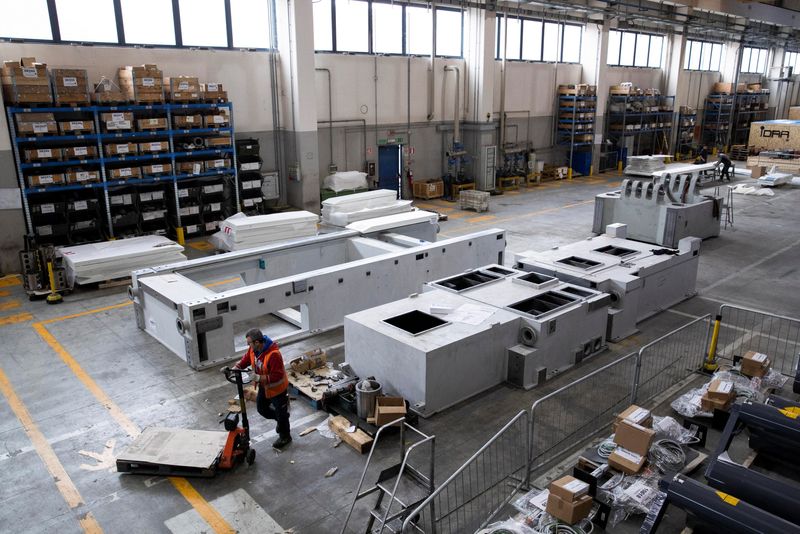By Giulio Piovaccari
TRAVAGLIATO, Italy (Reuters) - By replacing around 60 welded components with a single module, gigantic aluminium die casting machines made by the likes of Tesla supplier IDRA Group are helping carmakers to simplify manufacturing and cut costs by up to 40% in some areas.
Tesla has pioneered the use of massive casting machines, also known as gigapresses, to make large single pieces of vehicle underbodies, streamline production and reduce the work of even robots.
This has helped it become the most profitable battery electric vehicle (BEV) maker.
Critics say the process poses quality and flexibility risks, as a single flaw can compromise a whole module, and make fixing more difficult if something goes wrong.
But with the industry struggling to preserve profit margins amid surging raw materials prices, carmakers including Toyota, General Motors (NYSE:GM), Hyundai, Volvo Cars and Chinese electric vehicle startup Nio are turning to companies like IDRA for help.
"The basic idea was to provide a technology that could simplify the car production process," IDRA general manager Riccardo Ferrario told Reuters in an interview at the company's headquarters in Travagliato, northern Italy.
Battery packs currently make up 25%-40% of the total cost of BEVs.
"You need to make the rest cost less," Ferrario said.
Automakers using aluminium casting machines claim they can reduce investments needed to build chassis - a vehicle's second most expensive component after the engine - by 40%, and the average cost of their parts by 30%, Ferrario said.
"It's a way to eventually make BEVs something for all pockets," he said.
IDRA, which was taken over by Chinese group LK Industries in 2008, has been developing gigapresses since 2016. Competitors of IDRA and LK include Buhler Group in Europe, Ube Corp. and Shibaura Machine in Japan, as well as Yizumi and Haitian in China.
GIGAPRESS 9,000
Metal and plastic die casting has been largely used in manufacturing, but its application to large aluminium underbodies in carmaking is relatively new.
The global aluminium die casting market was worth almost $73 billion last year and is projected to top $126 billion by 2032, according to an AlixPartners analysis based on Apollo Reports data.
Aluminium is prized for its light weight, and is also used for other car parts including engines. The average content of the metal in European produced cars rose 20% to 179 kilograms in the three years to 2019, and is expected to increase to almost 200 kilograms by 2025, a study commissioned by lobby group European Aluminium shows.
IDRA's newest and biggest gigapress - the 9,000 - is the size of a small house and produces a clamping force of over 9,000 tons.
The company, which made 100 million euros ($108 million) in revenues in 2021, does not disclose its customers. But after it posted a video of the first Gigapress 9,000 ready for shipping, Tesla CEO Elon Musk said it was for his company's new cybertruck.
Tesla already operates gigapresses in all its facilities, including in Gruenheide, near Berlin, where it says it can churn out a Model Y in 10 hours - about three times faster than electric cars built by competitors.
Ferrario said IDRA had contracts with three automakers and as many 'Tier 1' parts makers. South Korea's Hyundai Motor is among them, sources familiar with the matter said.
Ralf Bechmann of manufacturing consultant EFESO said the benefits of die casting would push it "to be applied to an increasing number of new models of BEV vehicles, also by other manufacturers".
Front and rear underbodies cast by gigapresses are now combined with battery packs to form a three-piece chassis for BEVs.
"I bet 80% of automakers will use gigapresses by 2035, at least for BEV cars based on new platforms," Ferrario said. "But the real question is: will we need even bigger gigapresses?"
Yet not all automakers are convinced, and EFESO's Bechmann cautioned that large module die casting required product design to be "super solid".
"Fixing design flaws is much easier with a body made up of several small parts rather than a single module," he said.
After initially considering die casting for its upcoming Trinity model, Volkswagen (ETR:VOWG_p) has backtracked, while BMW has never expressed an interest.
Ferrario said the auto industry tended to be conservative and that no one liked upending established processes, but he rejected idea that die casting posed a risk to jobs at carmakers, noting body-making was already highly automated.

"The real issue will be with businesses supplying those little parts replaced by our modules," he said.
($1 = 0.9272 euros)